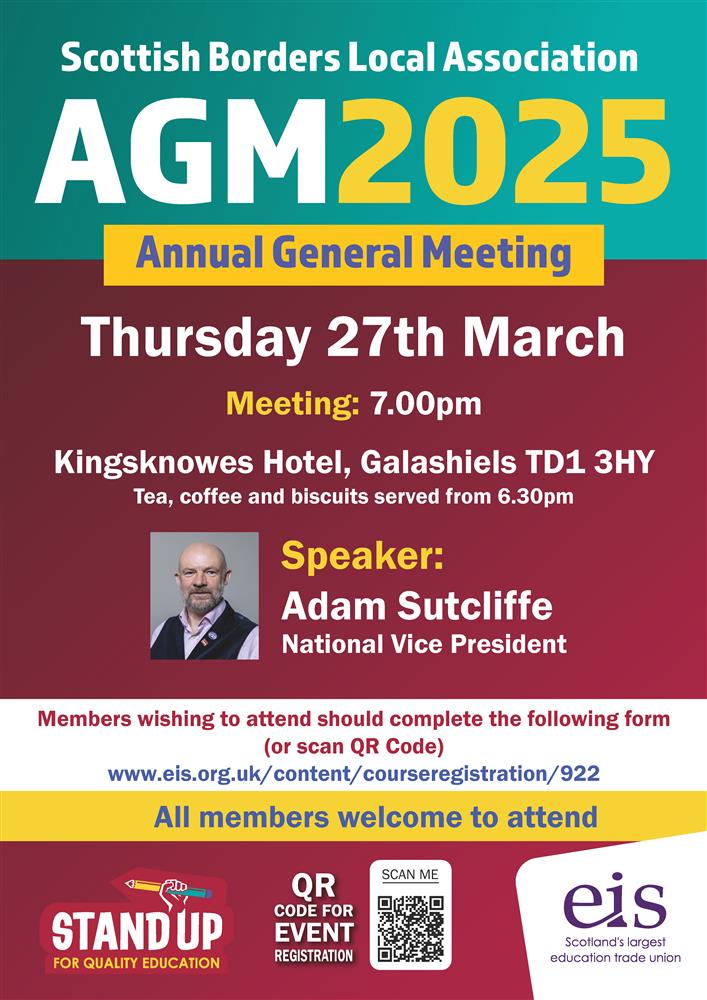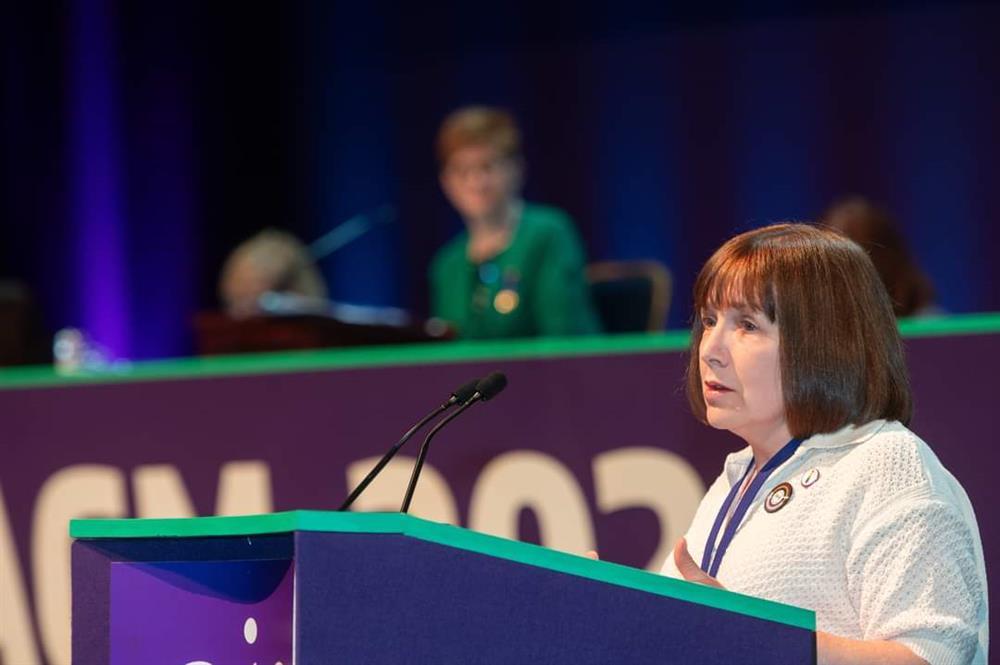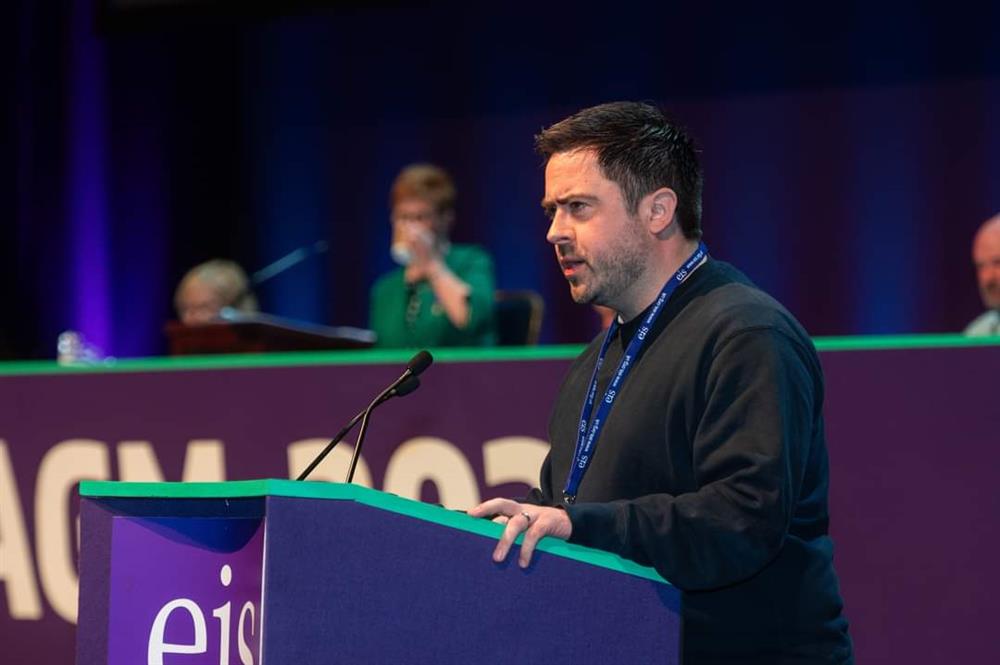Welcome to the Scottish Borders Local Association of the EIS
Please note: The Scottish Borders Local Association telephone number is 07904 835054. Our email address is borders@eis.org.uk.
Scottish Borders Local Association provides local advice and support to members. Natasha York is the Scottish Borders LA Secretary and can be contacted via phone and email (see above). Scottish Borders Local Association provides local advice and support to members. We hold regular LA Executive meetings to discuss local matters.
In order to keep up to date with the latest news, we ask that we are kept informed of any changes to your membership or contact information.
You can update your details by logging in to the My EIS section of the website https://www.eis.org.uk/Account/EISLogin or by emailing us on borders@eis.org.uk.


Dear Colleagues
In the run-up to the February break, I just wanted to give you some important updates and to signpost forthcoming events for March.
Local Negotiating Committee for Teachers (LNCT)
LNCT Agreement F5 Awarding Additional Salary Points for Relevant Experience is now available on the Scottish Negotiating Committee for Teachers (SNCT) website, which can be accessed via this link: https://www.snct.org.uk/lnctAgreements.php . This will take you to a page on the SNCT website where you can find our agreements by selecting Scottish Borders on the filter drop down menu. The panel which considers these applications meets at least once per term and has already approved two applications this month. I would strongly advise anyone considering applying to contact me for support and advice with their application.
IMPORTANT INFORMATION
Guidance for negotiating Working Time Agreements in schools: – LNCT Agreement A2 is now up and running and replaces previous guidance on the arrangements for negotiating Working Time Agreements. It is important that all teaching staff and SLTs understand that agreements reached by the LNCT are legally binding on the Council and the signatory unions, and the new guidance and proforma should be used going forward by all schools in setting up their Working Time Agreement. A copy of the Agreement is attached to this email, together with the Collegiate Calendar Calculator referred to in the Agreement.
Working Time Agreements exist to provide clarity on your terms and conditions, and when used correctly they are a powerful tool for controlling workload while maintaining collegiality and professionalism within the workplace. I would strongly encourage all members to take time to read this document so that you are fully informed of the expectations on all sides in this very important process. The guidance makes clear that all staff should be democratically involved in the process and that schools which do not have a union rep in place should have input and advice from Local Association level. Working Time Agreements are not valid until a school calendar has been agreed and they have been signed by both the Head Teacher and the nominated staff representative.
If you are in a school without a branch rep and would like advice or support on negotiating your Working Time Agreement, please get in touch via my contact details below.
Other issues:
Petition against cuts to Stirling Council’s Music Service: – Stirling Council has recently proposed to cut the funding of their music service by £250,000. An injury to one is an injury to all and in line with our trade union values we need to show solidarity with our colleagues in Stirling. Please use the following link to sign the petition. https://chng.it/Y784PvWrm6
LGBT Inclusive Education: – All local authority run schools in Scotland are expected to implement LGBT inclusive education through Curriculum for Excellence in alignment with the national approach. To support schools with LGBT Inclusive Education, the Scottish Government launched the platform https://lgbteducation.scot/ . Time for Inclusive Education in Schools (TIE) recently delivered training to all SBC Head Teachers, and have also produced new guidance note which can be accessed at the following link: https://www.gov.scot/binaries/content/documents/govscot/publications/advice-and-guidance/2024/12/guidance-lgbt-inclusive-education/documents/lgbt-inclusive-education-guidance/lgbt-inclusive-education-guidance/govscot%3Adocument/lgbt-inclusive-education-guidance.pdf
SCOTTISH BORDERS EIS LOCAL ASSOCIATION ANNUAL GENERAL MEETING
The AGM will be held at the Kingsknowes Hotel, Galashiels, on Thursday 27 March from 7-8.30pm with refreshments available from 6.30pm. This is an important opportunity to meet and talk with other members, influence the work of the EIS locally, discuss and agree local and national motions, and hear reports from elected officials.
This will be a hybrid in person and online event. We are delighted to announce that EIS Vice President Adam Sutcliffe will be attending. A registration link will be sent to your email shortly.
Well done if you have got to the end of this newsletter, and I wish you all a well-deserved and relaxing February break - only 9 sleeps to go!
Warmest regards
Natasha York
she/her
Scottish Borders EIS Local Association Secretary
Email: borders@eis.org.uk
Mobile: 07904 835054
My union days are Tues/Wed/Thurs. I teach at St Peter’s Primary School on Mondays and Fridays.
Title: Collegiate Agreement Guide Number: A2 Date: Nov 2024
Introduction
This guidance governs the negotiation of annual Working Time Agreements within schools and must be used in conjunction with the Excel Collegiate Calendar Tool provided by the SBC Education Dept. The headings included in the Collegiate Agreement Proforma have been agreed by the LNCT and must not be altered, although some may apply only to secondary schools. It is both acceptable and good practice to add explanatory notes under category headings for the sake of clarity.
This agreement applies to all teachers and is based on the Code of Practice on Working Time Arrangements for Teachers (SNCT Handbook, Part 2 Appendix 2.7). The SNCT Code of Practice on Working Time Arrangements for Teachers (WTA) states: “The individual and collective work of teachers should be capable of being undertaken within the 35-hour working week.”
NEGOTIATING ARRANGEMENTS
The arrangements set out in this agreement apply to all grades of teachers, including those in promoted posts. However, for the purposes of negotiating the WTA, members of the SLT will comprise the management side of the negotiations and PTs and unpromoted teachers will comprise the trade union side of the negotiations. LNCT Agreement A1 specifies which teaching unions are recognised by SBC as sole representatives of teaching staff. However, teaching staff who are not members of a trade union are entitled to full participation in the negotiating process. The provisions in this agreement will also apply on a pro rata basis to teachers who are contracted to work less than the full 35-hour working week and to those on fixed term contracts.
Each school must have in place a mechanism which allows managers and trade union members to engage in dialogue around relevant matters at school level. Each school must set up a School Negotiating Group (SNG) comprising equal numbers of managers and staff representatives, although in a small school this may not be possible. In this situation, head teachers may be supported by another head teacher or depute head. Staff representatives will include any existing union branch representatives and other teaching staff members who have been democratically nominated by the teaching staff. In a school with no union branch representatives, teaching staff will nominate appropriate representatives from among themselves. In this situation, staff should be able to seek advice from their respective unions. Staff representatives cannot be chosen by SLT.
Within each WTA, sufficient time must be allocated for negotiating the following year’s WTA (together with contingency time for issues which may need to be re-negotiated during the session). This time must be scheduled within the school calendar, and staff must participate in the same way as they would for any other agreed collegiate activity. When it is time to start negotiating the new WTA, the management side and the teaching staff side must meet separately during time scheduled in the School Calendar, to enable both parties to reflect and engage in collegiate discussions, considering the draft working time agreement from their own perspectives. The staff representatives should encourage teaching staff to complete an audit of the previous year’s WTA to facilitate an informed and evidence-based discussion on how to move forward. The management representatives should use the School Improvement Plan to provide estimated time costings for school and local authority strategic priorities.
Once these separate meetings have taken place, the SNG should meet to discuss both sides’ proposals and negotiate the finer details of the new WTA. Any points which cannot be agreed at this stage should be taken back to the teaching staff (and the SLT if necessary) for further discussion and resolution.
One of the key elements of the SNCT Code of Practice is the emphasis on enhancing the professional status of the career of teaching, providing greater professional autonomy for individual teachers, and ensuring a collegiate and participative style of management. In line with this, both sides of the SNG should strive to be as collegiate and co-operative as possible in agreeing the range of collective activities contributing to the wider life of the school, while preserving the terms and conditions of teaching staff as laid out in the SNCT.
Once the new WTA has been agreed, it must be signed by the Head Teacher and nominated staff representatives before it can take effect. It must be returned to the Joint Chairs of the LNCT, whose names and email addresses are shown at the end of this document.
Once finalised, the terms of the agreement will be respected by all and inform the work of the school over the session to which the WTA applies. Any changes required during the session will be subject to appropriate negotiation within the time allocated within the WTA itself and must take account of teacher workload.
TIME FRAME
By the end of April/May
By mid-June
By September
1.The 35 Hour Working Week
SNCT conditions of service set out the definition of a working week for teachers as follows:
2. Class Contact Time
LNCT Joint Secretaries: Date signed Nov 2024
Justin Sinclair Natasha York
Title: Collegiate Agreement Proforma Date: May 2024
Working Time Agreement for __________________
|
Collegiate Activity |
Time |
Running |
|
Parents Meetings
|
|
|
|
Staff Meetings
|
|
|
|
Reporting
The format used for reporting should not be changed during the course of a school session, unless agreed through the school negotiating committee. |
|
|
|
Planning
|
|
|
|
Curriculum Development
|
|
|
|
Professional Review and Development (PRD)
|
|
|
|
Professional Development Time for school-wide professional development, for example:
|
|
*Please see note below. |
Formal Assessment
Additional Supervised Pupil Activity
Time allocated for a range of activities eg attendance at events outwith the school day, preparation for educational trips and outings, Festival Week or Common Riding activities etc.
Additional Preparation and Correction Time
With regard to individual teacher workload, additional preparation and correction time may be required.
Other activities/flexibility
TOTAL
195
*NB: These would be hours allocated for CPD activities organised at school level. A teacher’s 35 hours of personal CPD is separate to this.
Please supply any additional information below:
e.g changes to collegiate/staff representative group or significant shifts in balance of time allocated this session.
We confirm that a calendar of events has been agreed for the session ahead.
We confirm that the attached WTA has been agreed by staff and is accepted as the pattern for the working year for teaching staff in this school/establishment for the session ahead.
Signature: Date:
Head Teacher
Staff representative/s
The WTA should be signed by the Headteacher and staff representative/s. A copy of the WTA, along with the school calendar for the session, should be forwarded to both Joint Secretaries of the LNCT:
Justin Sinclair email Justin.Sinclair@scotborders.gov.uk and Natasha York borders@eis.org.uk
prior to the summer holiday.

Natasha York (EIS Borders LA Secretary) speaking about the importance of supporting our LGBTQ+ young people in schools.

Martin Christison (EIS National Council) speaking about greater transparency about PEF spending at school and local authority level.
.
Congratulations to former EIS Scottish Borders LA Secretary, Lindsay Craig, who received a Fellowship of the EIS (FEIS) at this year's national AGM in Dundee. This honour was to recognise her dedication to the empowerment of others through her activism and service to the EIS locally and nationally. She was highly respected by colleagues on the Local Executive Committee and by the council officials she dealt with regularly. In her many EIS roles, but especially as LA Secretary, she was always enthusiastic, reliable, well-prepared and informed and had a calm and thoughtful manner which engendered excellent working relationships with everyone. Through the most difficult times, as Covid hit hard in 2020 and 2021, Lindsay was a steadying hand locally which gave huge confidence to EIS members. She was also a strong influence at council level, to ensure effective H and S mitigations in schools. During 2022’s teacher strikes, Lindsay organised many successful events and pickets locally and in this, as everything, was a highly visible EIS presence for and with Scottish Borders EIS members. She is still involved with the EIS (even in retirement!) as she has taken on the role of the Benevolent Fund co-ordinator for Scottish Borders LA
Biggest and best
Most Affordable
Improving Pay and Conditions
CPD training and events
Equality Network and campaigns
Over 80% of teachers and lecturers are EIS Members